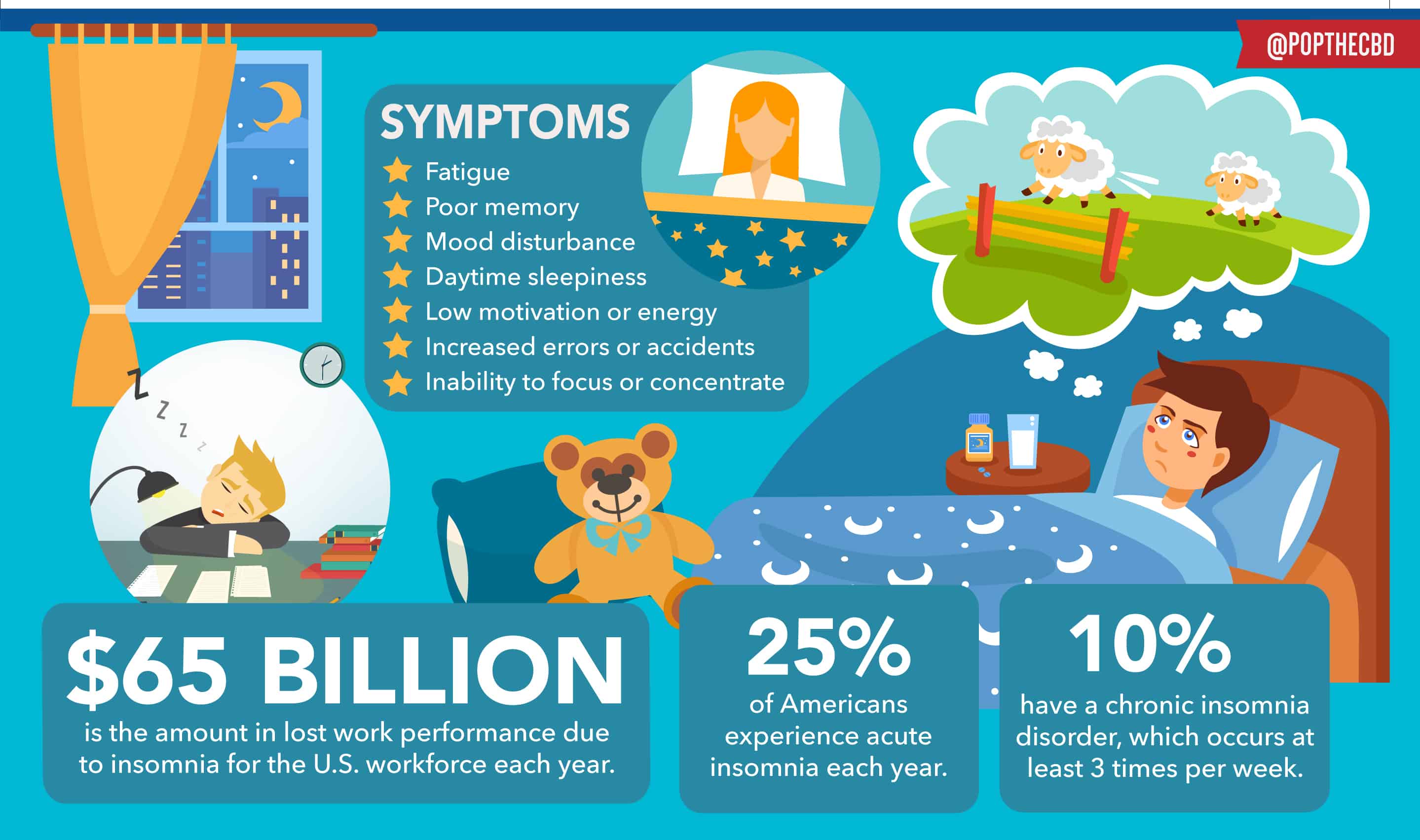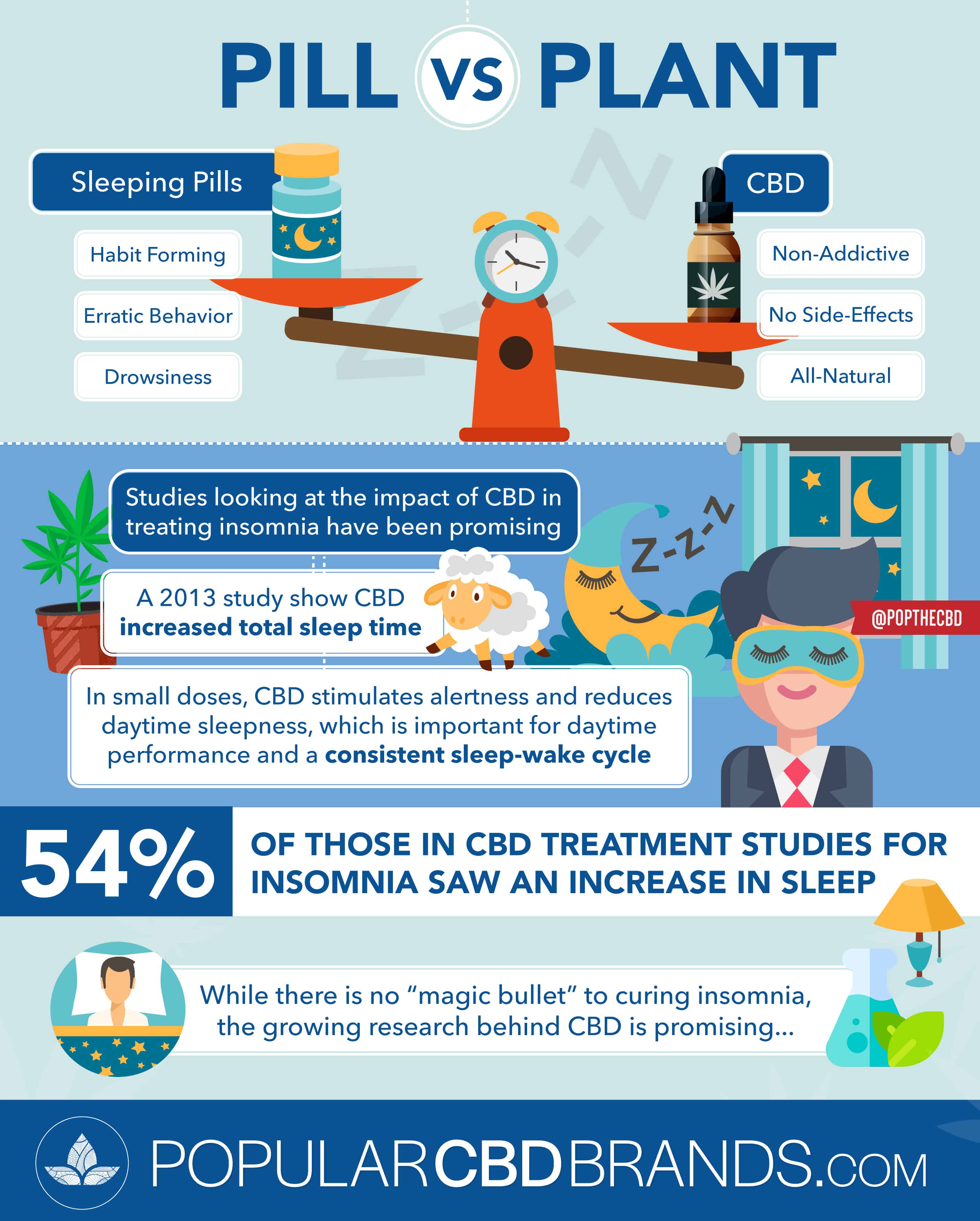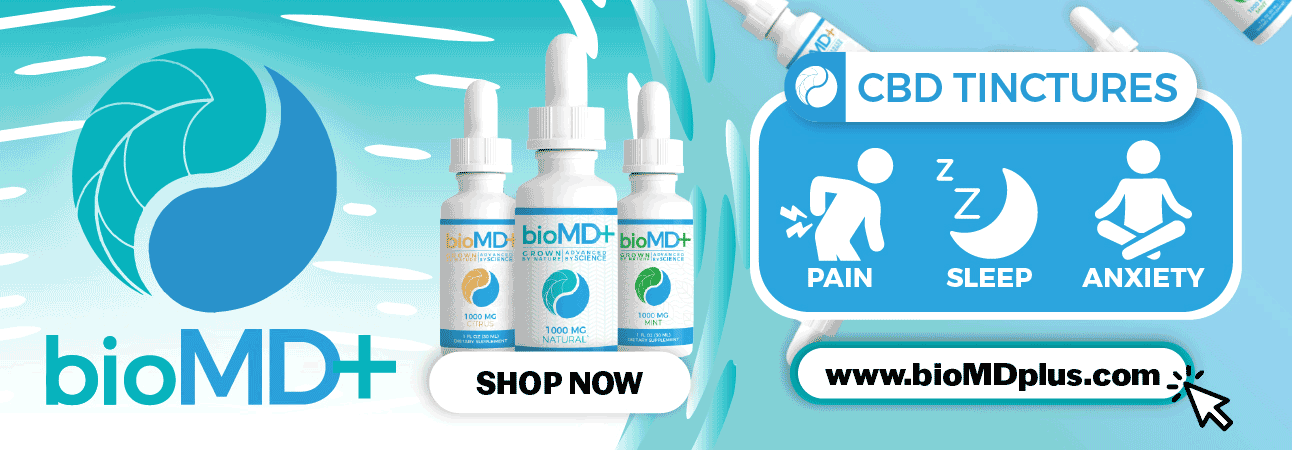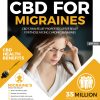CBD for Sleep: Can Hemp Extract Cure Insomnia?
In the United States alone, tens of millions of people suffer from sleep disorders. It’s likely that many more fall within the range of normal but simply have occasional difficulty falling asleep. Whether you have a diagnosed sleep disorder or not, an inability to consistently fall asleep at night can significantly affect your quality of life. At night, you spend your time awake and alone while your loved ones are sleeping. During the day, you have trouble concentrating and staying awake as you go about your business. You feel short-tempered and irritable. You’d do just about anything to improve sleep quality.
You’re here because you want to know if taking CBD for sleep can work for you. Our job is to help guide you through that decision by explaining what CBD is and describing how it may work to treat insomnia. We’ll also walk you through some relevant scientific studies that can help you to make an informed decision.

CBD for Sleep: Our Top Pick
We understand that you might not be here with the intention of learning everything there is to know about CBD and how it may work to resolve sleeping problems. You may have already decided that you want to try CBD for your insomnia; you simply want to know which CBD will help you stay asleep.
We’ve reviewed all of the world’s most popular CBD products, and our review panel and readers are unanimous in selecting BioMD+ as the best CBD for sleep. We consistently rank BioMD+ as one of the best CBD oil brands because we like the company’s commitment to delivering a top-quality product at every step in the process. With prime organic hemp from Colorado and ongoing batch testing, we’re always confident that we’re getting exactly the advertised product when we order from BioMD+.
The other feature of BioMD+ that we love is the fact that the company enhances its products with terpenes that may help the CBD treat certain health issues more effectively. BioMD+ Mint Hemp Oil Extract, for example, contains terpenes selected to reduce anxiety and help with stress management.
What Is a Sleep Disorder?
A sleep disorder is a medical problem that results in difficulty falling asleep or staying asleep. Having a sleep disorder may mean that you lie awake at night when you want to be sleeping. It may mean that you wake up repeatedly during the night. Some sleep disorders involve abnormal bodily movements such as involuntary tooth grinding. Others involve feeling tired during the day even though you believe you got enough sleep the night before. It’s estimated that tens of millions of Americans require treatment for insomnia and other sleep disorders. It’s likely that millions more would benefit from a natural remedy for occasional sleeplessness.
Common Types of Sleep Disorders
Sleep disorders may manifest themselves with different symptom combinations and may have different root causes. Some of the potential causes of sleep disorders include stress and anxiety, physical issues such as obesity and lifestyle choices such as overconsumption of caffeine or alcohol. These are some of the most common sleep disorders.
- Insomnia: Insomnia is the most common type of sleep disorder. Sufferers have difficulty falling asleep and may wake up repeatedly during the night. Those with insomnia frequently get up in the morning feeling unrefreshed from sleep and may have serious problems with interpersonal relations and work effectiveness because of their exhaustion.
- Night Terrors: Night terrors are different from nightmares in that they occur before the sufferer reaches the REM stage of sleep. If you suffer from night terrors, you may awaken repeatedly during the night with uncontrolled feelings of fear and panic. Night terrors can severely affect sleep quality, both by reducing the total time the sufferer spends asleep and by reducing the amount of time spent in the REM stage of sleep.
- Narcolepsy: Narcolepsy is an excessive sleepiness that occurs during the day. It’s often comorbid with insomnia and sleep apnea as people who rarely experience refreshing sleep often have trouble staying awake during daytime. Those with true narcolepsy may fall asleep at any point during the day, regardless of what they’re doing at the time.
- Restless Legs Syndrome: Sufferers experience repeated nighttime urges forcing them to move their legs. RLS symptoms usually appear at night while the sufferer sits or lies down. The discomfort may become so profound that finding relief becomes impossible unless the sufferer gets out of bed and walks around.
- Bruxism: Sufferers bite down and grind their teeth while sleeping. If you suffer from bruxism, you may wake up with tooth and jaw pain that slowly abates during the day. Sometimes, those with bruxism grind their teeth so loudly at night that the noise awakens their spouses. Bruxism damages teeth and causes dental work to fail. It may also cause you to wake up repeatedly during the night.
- Sleep Apnea: Sufferers stop breathing – sometimes repeatedly – while they sleep. Sleep apnea can happen because an obstruction such as soft tissue in the throat blocks the airway at night. There is also a type of sleep apnea in which the brain stops sending the signals necessary for the body to breathe. Sleep apnea can be a life-threatening medical condition, and it requires professional intervention.

The Challenges of Treating Insomnia
One of the challenges of treating insomnia is the fact that sleep orders often overlap with one another and may have different root causes. A changing work schedule, frequent travel, caffeine overuse, recreational drug use and family history are all risk factors for sleep disorders. The other challenge is that prescription medications for sleep – though they do work – often have undesirable side effects. Consider, for example, some of the common side effects of zolpidem (Ambien), one of the most popular prescription drugs for sleep.
- Feeling sleepy during the day
- Feeling weak, dizzy or lightheaded
- Irritation in the throat, nose and mouth
- Diarrhea or other gastrointestinal issues
- Feeling high or drugged
- Sleepwalking
Ambien can also cause dependency. Rare side effects include severe mood changes and thoughts of suicide. If ever there was a case of the cure being worse than the disease, zolpidem certainly is it for some people. It isn’t surprising, then, that many would seek out a natural remedy for insomnia as an alternative to prescription medication.
What Is CBD?
Cannabidiol (CBD) is a chemical compound isolated from the industrial hemp plant. Hemp is the same plant as cannabis or marijuana, and the most plentiful compounds in it are called cannabinoids. The best-known cannabinoid is THC. That’s the compound that gives marijuana users a sense of euphoria. Industrial hemp, however, contains less than 0.3 percent THC. It will not get you high if you smoke it. In 2018, the federal government legalized the production of industrial hemp across the United States. It’s useful for its nutritious seeds and strong fibers. An extract of industrial hemp has a high concentration of CBD, and consuming that extract will not alter your mental state.
Recently, researchers have taken an interest in industrial hemp for its CBD content. While many states have legalized THC for medical uses, some states still have not. In addition, some people consider THC’s psychotropic effects undesirable. Over the past two decades or so, researchers have studied CBD’s effects on a variety of medical conditions ranging from high blood pressure to chronic pain. CBD’s anti-inflammatory and anxiolytic properties are well documented. It’s even approved by the FDA for the treatment of certain types of seizures.
Scientific Studies About CBD and Sleep Disorders
CBD interacts with the body’s endocannabinoid system. Many of the cells in the body have cannabinoid receptors, and the body produces endocannabinoids that transmit messages across those receptors. CBD – like THC – is an exogenous cannabinoid that binds to those same receptors. That’s important because the endocannabinoid system plays a role in the sleep-wake cycle. Researchers have therefore studied CBD extensively to determine whether it could be useful as a treatment for insomnia. These are some of the most interesting studies involving CBD and sleep disorders.
- In 2019, The Permanente Journal published the results of a clinical review encompassing 25 patients complaining of poor sleep quality. The patients were given CBD and evaluated monthly. After the first month, two thirds of the patients reported improved sleep quality.
- In 2013, the Journal of Psychopharmacology published the results of a placebo-controlled sleep study in which rats were given large doses of CBD via injection. In this study, the researchers found that CBD administration allowed the rats to get to sleep more quickly. CBD also appeared to increase the rats’ total sleep time, although the study specified that the difference in sleep duration between the CBD and placebo groups wasn’t statistically significant. The rats given the highest doses of CBD fell asleep most quickly.
- In 2012, Neuropharmacology published the results of a study examining the effect that CBD could have on the sleep-wake cycles of patients with post-traumatic stress disorder. The researchers used a maze designed to induce anxiety in rats. Following the onset of anxiety, the researchers injected CBD into the rats’ brains. CBD reduced the rats’ anxiety and increased the duration of their REM sleep. The result suggests that CBD treatment could improve sleep quality in patients with PTSD.
- In 2018, Medicines published the results of a study evaluating the effect that medical marijuana had on patients with insomnia. In the study, 409 volunteers used a mobile app to describe the cannabis strains used and to rate the effects those strains had on sleep quality. The study concluded that medical cannabis significantly improves sleep. In addition, the study found CBD to have a higher correlation with symptom relief than THC.
- In 2017, Current Psychiatry Reports published a major review of literature involving cannabis and sleep. The review concluded that CBD appears to hold promise as a modulator for REM sleep and as a way of helping people stay awake during the day. Studies using synthetic cannabinoids have also produced positive results in those with sleep apnea related to serotonin production.
- In 2018, Frontiers in Pharmacology published the result of a double-blind crossover study in which 27 volunteers were given both CBD and a placebo on consecutive nights. The study involved healthy individuals who did not have sleep disorders. Among those people, CBD had no significant effect on sleep-wake cycles. The study suggests that CBD can be used safely for occasional sleeplessness without fear of negative side effects.
- In 2017, Sleep Medicine published the result of a study in which six patients were given cannabis for the treatment of Restless Legs Syndrome. Of those patients, five reported complete disappearance of RLS. One of the five patients achieved total RLS remission using only CBD.
- In 2014, Current Neuropharmacology published a review of literature examining CBD’s properties as a wake-inducing agent. The review concluded that because CBD appears to help modulate the sleep-wake cycle, it’s possible that it may have some use in the treatment of daytime drowsiness.
CBD vs. Medical Marijuana for Sleep
If you live in a state that allows recreational or medical cannabis use, marijuana presents another potential option that you might use rather than CBD for sleep. As a treatment for insomnia, marijuana has benefits and drawbacks. On one hand, studies show that marijuana lessens the amount of time needed to fall asleep – even among those without sleep disorders.
On the other hand, THC also alters the sleep cycle by decreasing the amount of time spent in the REM stage. It is possible that prolonged THC use may diminish sleep’s ability to refresh and restore the body. A 2014 study published in the Journal of Addictive Diseases states that daily marijuana users report more sleep disturbances than those who only use it occasionally. In addition, using a large dose of THC for sleep may mean that you’ll feel groggy the next day.
Using medical marijuana for sleep may present additional challenges when you decide to take a break from using the drug. During cannabis withdrawal, people frequently report that they have difficulty falling asleep and experience unusual dreams once they are asleep.
In comparison to medical marijuana, CBD doesn’t have the same powerfully sedating effect. However, it also appears to normalize the stages of sleep rather than altering their duration. In addition, people who use CBD oils for sleep generally report no withdrawal symptoms when discontinuing use.
Ways to Take CBD for Sleep
The most common way to use CBD for sleep is by holding an oil-based CBD tincture under the tongue for several seconds before swallowing it. This method of using CBD combines fast sublingual absorption with the slower absorption of the digestive system. CBD oil may be useful for those whose sleep disorders involve both an inability to fall asleep and an inability to stay asleep throughout the night.
If you fall asleep easily but wake up often throughout the night, you might prefer to let your digestive system process all of the CBD in order to achieve a longer-lasting effect. In that case, you can simply swallow CBD oil rather than holding it under the tongue. Alternatively, you can use edible forms of CBD such as CBD gummies.
Vaping is another common method of using CBD for sleep. You can vape CBD oil by attaching an oil cartridge to a standard vape pen. Vaping CBD oil allows it to enter the bloodstream quickly, which may help to improve sleep latency. The fast absorption may also help those who experience panic due to night terrors.
Using CBD With Prescription Medication for Sleep
CBD inhibits production of the enzymes CYP3A4 and CYP2D6. The body uses those enzymes in the process of breaking down many types of drugs including benzodiazepines, antihistamines, antidepressants and selective serotonin reuptake inhibitors. If your body can’t break down prescription medications at the normal pace, you may have higher than normal levels of those drugs in your blood if you use CBD for sleep. If you use a prescription medication, talk to your doctor before using CBD. Your doctor will monitor you and may decide to adjust some medication dosages.
How to Choose the Best CBD for Insomnia
The best part of using CBD for insomnia is that, unlike most prescription sleep aids, CBD doesn’t cause a rebound effect when you stop using it. If you take a break from a prescription medication, your sleep disorder may temporarily become worse than it was before you began using the medication.
With study after study suggesting that CBD can be useful in supporting the body’s ability to maintain a natural sleep-wake cycle, there is no question that CBD is worth trying as a remedy for sleeplessness. The real question is, out of the many products available, how do you choose the best CBD for insomnia? We presented our recommendation at the beginning of the article. If you’d like to research further, though, we’ll offer some suggestions.
Before buying any CBD product, you should learn as much as possible about the growing conditions for the hemp used to make the extract. Hemp draws heavy metals, radiation and pesticides from the soil in which it is grown. We suggest using CBD sourced from domestic hemp whenever possible. Top-quality CBD hemp is a labor-intensive crop, but it grows well under a wide variety of conditions. It doesn’t require pesticides or industrial fertilizers, so there’s no need to pay a premium price for CBD extracted from organic hemp.
We also suggest looking at the terpene profile of a CBD product before buying it. Terpenes are phytochemicals that occur naturally in plants such as hemp, and some terpenes are known to benefit those with anxiety or sleep disturbances. A full-spectrum hemp extract will contain the terpenes from the original plant, but it may also contain trace THC.
If you’re concerned that a trace amount of THC could cause you to fail a drug test, you should buy a CBD product made from THC-free CBD isolate instead. Some companies add terpenes to their isolate-based CBD oils. As mentioned at the top of the article, BioMD+ is one of those companies.
We believe that a CBD product with added or naturally occurring terpenes may provide the most benefit for those with insomnia and other sleep disorders.
Do Other Natural Insomnia Remedies Work?
If you have a serious sleep disorder, we recommend consulting with your doctor before trying any natural remedy for insomnia – even CBD. Some sleep disorders such as apnea and narcolepsy are potentially life threatening. If you have experienced negative side effects when using prescription medications for sleep, though, your doctor will likely support you in seeking out alternative remedies.
People have long known that the key to having a good day is to get a good night’s sleep the evening before. Even otherwise healthy individuals experience sleeplessness from time to time, and people use a variety of natural and non-drug remedies to improve sleep quality. Which of those remedies have science on their side? We’ve searched for relevant studies that you might find helpful.
- Acupuncture: In 2009, the Journal of Alternative and Complementary Medicine published a review in which researchers examined medical literature on the subject of acupuncture and sleep. The review drew from 46 randomized trials with 3,811 total participants. The review concluded that acupuncture appears to be effective in treating insomnia. It can also increase the effectiveness of prescription medications.
- Melatonin: In 2014, Nutrition Journal published a review of 35 randomized melatonin trials. The review found a weak correlation between melatonin use and improved sleep in individuals with jet lag and those with occasional or persistent insomnia.
- 5-Hydroxytryptophan (5-HTP): According to the University of Michigan Health Library, one double-blind study of healthy volunteers without sleep disorders found that 5-HTP supplementation may improve sleep quality by lengthening the REM phase of sleep. Compared to some other natural sleep remedies, though, there is little clinical evidence supporting the effectiveness of 5-HTP.
- Gamma-Aminobutyric Acid (GABA): In 2015, the Journal of Nutritional Science and Vitaminology published a study in which researchers examined the effect of GABA on sleep. The researchers found that GABA allowed study participants to fall asleep an average of 5.3 minutes more quickly.
- Valerian: In 2006, the American Journal of Medicine published a review examining the effectiveness of valerian for sleep. To compile the review, researchers examined 16 studies with a total of 1,093 participants. The review concluded that valerian may improve sleep quality but found methodologic problems and bias in the studies examined.
- Kava: In 2005, Psychopharmacology published a rat study examining the effects of kava extract on sleep latency and quality. In the study, kava both helped the rats fall asleep more quickly and improved their quality of sleep.
- Passion Flower: In 2011, Phytotherapy Research published a placebo-controlled crossover study in which participants drank passion flower tea or a placebo before going to sleep. The study’s results suggested that – at least in short-term use among those without sleep disorders – passion flower can significantly improve sleep quality.
- Lemon Balm: In 2011, the Journal of Nutrition and Metabolism published a study in which 20 participants with anxiety disorders and sleep disturbances were given a standardized dose of lemon balm. Of the 20 participants, 17 reported that they no longer had trouble sleeping. Although this was not a placebo-controlled study, the result strongly suggests that lemon balm may offer relief from insomnia.
- Hypnosis: In 2014, Sleep published a placebo-controlled study in which 70 young, suggestible females were played a tape with hypnotic suggestions or a control tape before taking an afternoon nap. Those who listened to the hypnotic tape fell asleep more quickly and slept more deeply.
- Music Therapy: In 2014, the International Journal of Nursing Studies published a review in which researchers examined existing studies evaluating the effectiveness of music therapy in treating those with sleep disorders. The review analyzed 10 studies with 557 total participants. The review concluded that music therapy has a clear benefit among those with sleep disorders.
Jacob Daniels
Latest posts by Jacob Daniels (see all)
- Best CBD Companies - September 8, 2020
- Can you Dab CBD? The Answers May Surprise You - May 19, 2020
- Savage CBD Review - May 10, 2020










